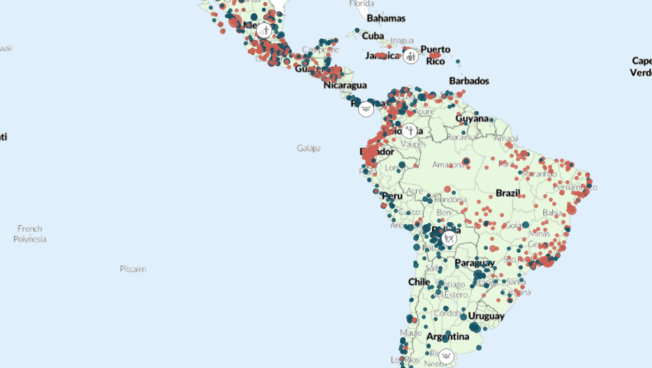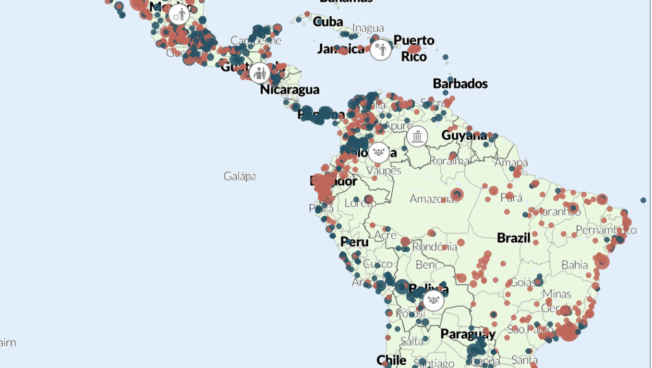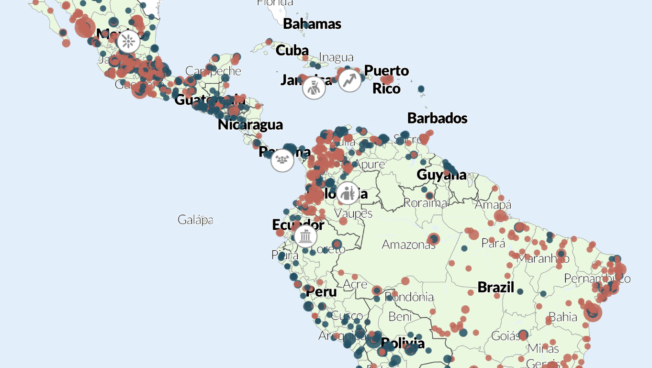Regional Overview
Latin America and the Caribbean
September 2024
Posted: 4 October 2024
In this Regional Overview
- Bolivia: Evo Morales and Luis Arce’s supporters clash amid rising polarization over the 2025 election candidacy
- Brazil: Violence targeting candidates rises ahead of 2024 municipal elections
- Guadeloupe and Martinique: New security measures issued in response to cost-of-living demonstrations
- Honduras: Armed suspects kill environmental activist in Colón who exposed local government-criminal ties
- Mexico: Infighting within Sinaloa Cartel escalates in Sinaloa state, spilling into Sonora and Chihuahua
- Venezuela: Opposition loses momentum after presidential candidate flees into exile
Bolivia: Evo Morales and Luis Arce’s supporters clash amid rising polarization over the 2025 election candidacy
On 16 September, former President Evo Morales called on his supporters to demonstrate against President Luis Arce and to back his presidential candidacy in a six-day march toward La Paz.1EFE, ‘Evo Morales inicia una marcha que el Gobierno boliviano señala de intento de “golpe de Estado,”’ 17 September 2024 Farmers and Indigenous communities took to the streets across La Paz department, demanding Arce’s resignation and early elections and expressing dissatisfaction with the country’s economic situation.2María Silvia Trigo, ‘Crece la tensión en Bolivia: movilizaciones y marchas anticipan una semana compleja para el Gobierno,’ Infobae, 13 September 2024 This drove an increase in demonstrations in September, with over 80 events recorded in La Paz department — the highest since ACLED began coverage of the country in 2018. Although demonstrations were mostly peaceful, clashes took place between Morales and Arce supporters and between demonstrators and police forces, highlighting deepening political tensions.3BBC News Mundo, ‘Las imágenes de la marcha de protesta encabezada por Evo Morales contra Luis Arce por las próximas elecciones en Bolivia,’ 18 September 2024
Morales is leveraging discontent over the government’s economic policy to push for his candidacy as the Movement for Socialism (MAS) party’s nominee in the August 2025 general elections, a position he is contesting with President Arce.4Al Jazeera, ‘Tension in Bolivia as Morales issues 24-hour ultimatum to Arce government,’ 24 September 2024 In December 2023, the constitutional court issued a ruling barring Morales from a fourth term, which Arce attempted to ratify through a referendum later declared inadmissible.5Thomas Graham, ‘Bolivia: protest march by ex-president’s supporters reflects split at heart of left,’ The Guardian, 22 September 2024; EFE, ‘El Gobierno de Bolivia insistirá con el referendo tras el rechazo del Tribunal Constitucional,’ 3 September 2024 Morales had previously been forced to stand down from the presidency after a controversial 2019 election marred by unrest, allegations of electoral fraud, and constitutional concerns over his eligibility having exceeded a mandated two-term limit.6Santiago Anria and Jennifer Cyr, ‘Is Bolivia’s democracy in danger? Here’s what’s behind the disputed presidential election.,’ the Washington Post, 30 October 2024 The longstanding feud over MAS leadership and the country’s economic downturn have heightened political tensions that led to a failed coup attempt in June and could further fuel polarization as the next election year approaches.
Brazil: Violence targeting candidates rises ahead of 2024 municipal elections
Violence targeting political figures intensified ahead of the 6 October municipal elections, more than doubling levels during the month prior. In September, ACLED records at least 25 violent incidents targeting political figures, accounting for more than a quarter of all such incidents recorded thus far this year. These primarily involved direct attacks on candidates and their associates, clashes between party supporters, and acts of intimidation, such as the destruction of candidates’ properties. Organized crime’s influence on elections is significant, often involving violence, threats, and coercion against politicians and voters to ensure the election of candidates favoring their activities. In Rio de Janeiro state, the Electoral Supreme Court relocated 53 polling stations due to security concerns tied to organized crime,7Vitor Abdala, ‘Infiltração de criminosos na política ameaça segurança eleitoral,’ Agência Brasil, 22 September 2024 while in Bahia state, drug traffickers reportedly blocked candidates’ access to communities in the Camaçari municipality.8Alô Juca, ‘DENÚNCIA: Facção das “duas letrinhas” teria proibido candidatos de entrar em determinadas comunidades em Camaçari; veja vídeo,’ 27 September 2024
Nonetheless, violence remains lower than in 2020, a year in which ACLED records over 280 violent incidents targeting political figures, which were concentrated around the November municipal elections. At the time, this reflected Brazil’s heightened political polarization amid a pandemic and economic crisis under Jair Bolsonaro’s presidency. In contrast, in 2024, President Luiz Inácio Lula da Silva’s administration and the fragmentation of the far-right opposition into multiple parties have created a more subdued political environment.
Guadeloupe and Martinique: New security measures issued in response to cost-of-living demonstrations
Demonstrations coordinated by the Assembly for the Protection of Afro-Caribbean Peoples and Resources (RPPRAC) over the cost of living broke out in Martinique on 1 September. Despite the temporary detention of the movement’s leader, Rodrigue Petitot,9Ouest-France, ‘Martinique : qu’est-ce que le RPPRAC, le mouvement à l’origine des manifestations actuelles?’ 19 September 2024 for allegedly attempting to steal a public bus in the Dillon neighborhood, the mobilization continued. Demonstrators demanded that supermarket prices in the overseas territories be aligned with those in mainland France, where food prices are on average 40% lower.10Enzo Dubesset, ‘En outre-mer, le retour des manifestations contre la vie chère,’ La Croix, 8 September 2024; Maurice Bilionière and Zinaïda Salibekyan-Rosain, ‘En Martinique, les produits alimentaires sont 40 % plus chers qu’en France métropolitaine,’ Insee, 11 July 2023; Lanwenn Le Corre, ‘En Guadeloupe, les prix sont plus élevés de 12,5 % qu’en France métropolitaine,’ Insee, 14 April 2016
Initially, demonstrations involved peaceful sit-ins blocking supermarket access and looting. On 5 September, local authorities attempted to soothe the unrest by announcing a 20% price cut on 2,500 products.11Jean-Michel Hauteville, ‘En Martinique, la vie chère provoque des tensions,’ Le Monde, 15 September 2024 However, the RPPRAC deemed the measure insufficient, and tensions escalated, particularly in Fort-de-France. From 12 September, rioters set up roadblocks, threw Molotov cocktails at police, and fired at the gendarmerie station in Fort-de-France, prompting police to fire back and resulting in one rioter and six gendarmes being injured. As unrest continued, authorities enforced a curfew in parts of Fort-de-France on 18 September and, for the first time since 1959, deployed anti-rioting police from mainland France.12Le Monde, ‘A la Martinique, le couvre-feu partiel est prolongé jusqu’au jeudi 26 septembre,’ 24 September 2024 Similar protests broke out in Guadeloupe on 20 September, with roadblocks and clashes with police, mainly in Saint-Rose. In response, the prefect imposed a curfew for unaccompanied minors on 23 September in Point-à-Pitre, Abymes, Gosier, Sainte-Rose, Capesterre-Belle-Eau, and Lamentin. ACLED records about 30 demonstration events in Martinique and over 10 in Guadeloupe this month, the highest since the anti-COVID-19 health pass demonstrations held in November 2021 and mobilization against pension reforms in March 2023, respectively.
Honduras: Armed suspects kill environmental activist in Colón who exposed local government-criminal ties
On 14 September, gunmen killed environmental activist and councilor Juan Antonio López in Tocoa, Colón. A member of the ruling Liberty and Refoundation (LIBRE) party, López had advocated for the defense of water resources and opposed mining and hydroelectric projects in the Bajo Aguán region, spanning Colón and Yoró departments.13Gustavo Palencia, ‘Honduran anti-mining activist who fought to save rivers is killed,’ Reuters, 15 September 2024 Days before his killing, López had called for the resignation of Tocoa’s LIBRE mayor, Adán Fúnez, following the release of a 2013 video showing Fúnez and Carlos Zelaya, President Xiomara Castro’s brother-in-law, discussing a US $650,000 contribution to Castro’s presidential campaign with drug traffickers.14Héctor Silva Ávalos, ‘Los tentáculos de la narcopolítica en el asesinato del ambientalista Juan Antonio López en Honduras,’ Infobae, 22 September 2024 The video emerged shortly after Castro suspended an extradition treaty with the United States.15Marlon González and Megan Janetsky, ‘Hondurans disillusioned with leader amid scandal and end to US extradition treaty,’ Associated Press, 4 September 2024 Prior to this, López had long been the target of threats linked to mining interests, and in October 2023, the Inter-American Commission on Human Rights granted him protection measures.16Inter-American Commission on Human Rights, ‘Resolución 55/23, Medidas Cautelares No. 137-23. Integrantes identificados del Comité de Defensa de los Bienes Comunes y Públicos de Tocoa y otros respecto de Honduras,’ 5 October 2023, p. 4 Despite government pledges to enhance protection measures, human rights groups and environmental organizations report ongoing violence targeting activists.17Gustavo Irías, ‘Análisis Semanal | La reactivación de la violencia paramilitar en el Bajo Aguán, urge de la intervención estatal para resolver las causas de la conflictividad social en la zona,’ Centro de Estudio para la Democracia, 21 January 2023 In 2023 alone, ACLED records at least 16 events of violence targeting environmental and land defenders and the reported killing of 22 activists and their relatives. López’s killing adds to at least seven other direct attacks targeting land defenders this year.18Lucía Vijil and Kevin Isidro, ‘Así avanza la conflictividad socioterritorial en Honduras, acentuada por la falta de un abordaje integral,’ CESPAD, September 2024
Mexico: Infighting within Sinaloa Cartel escalates in Sinaloa state, spilling into Sonora and Chihuahua
Tensions between the Sinaloa Cartel’s Los Chapitos — led by the sons of Joaquín ‘El Chapo’ Guzmán Loera — and El Mayo factions escalated into open conflict on 9 September, leading to the highest violence level in Sinaloa state since 2018, with around 100 reported fatalities, mostly concentrated in Culiacán and its surroundings. This escalation follows the arrests of Ismael ‘El Mayo’ Zambada García and Joaquín Guzmán López, son of El Chapo, in the US earlier in July. Zambada has since accused Guzmán López of betraying him to law enforcement, fueling widespread speculation about imminent retaliation.19Elías Camhaji, ‘Life stops in Sinaloa amidst war between El Mayo and Los Chapitos,’ El País, 16 September 2024
The infighting has also affected other states with a strong Sinaloa presence, including Baja California, Chihuahua, and Durango, as rival groups have been exploiting the cartel’s internal fractures to expand their operations.20Almudena Barragán, ‘La guerra de cárteles en Sinaloa extiende el miedo a otros Estados del país: “Se ve menos gente en las calles y los negocios cierran temprano,”’ El País, 24 September 2024 Similarly, in Sonora, gang-related violence rose by 33% in September compared to the month prior amid clashes between factions allegedly tied to the Sinaloa Cartel.21Andrés Martínez, ‘Por guerra entre Los Rusos y Los Salazar refuerzan seguridad en Sonora y Baja California; hay tres detenidos,’ Infobae, 28 September 2024
This surge in violence poses a significant challenge for President Claudia Sheinbaum, who was sworn in on 1 October, amid expectations of further militarization following former President Andrés Manuel López Obrador’s constitutional reform placing the National Guard under military control, which was approved on 25 September.22Fabiola Sánchez, ‘Mexico’s Congress puts National Guard under military command despite criticism. Why does it matter?’ Washington Post, 25 September 2024
Venezuela: Opposition loses momentum after presidential candidate flees into exile
On 8 September, opposition presidential candidate Edmundo González fled to Spain, where he was granted asylum.23MercoPress, ‘Venezuelan opposition leader Edmundo González arrives in Spain after receiving political asylum,’ 8 September 2024 His departure followed an arrest warrant issued against him on alleged charges of usurpation of functions, forgery of public documents, incitement to disobedience, conspiracy, sabotage, and illicit association.24BBC News Mundo, ‘Mi salida de Caracas estuvo rodeada de presiones y amenazas: Edmundo González promete continuar su lucha por Venezuela desde el exilio,’ 9 September 2024 Once in Spain, González claimed that pro-government officials coerced him into signing a letter recognizing Nicolás Maduro’s victory in the 28 July elections as a condition for leaving the country.25DW, ‘González Urrutia dice que lo obligaron a firmar documento,’ 18 September 2024 Despite opposition leader María Corina Machado’s assertion that the opposition would continue challenging the election results from abroad, González’s escape seems to have dampened hopes for political change in Venezuela.26Genevieve Glatsky, ‘Con Edmundo González asilado en España, las esperanzas de democracia se reducen en Venezuela,’ New York Times, 9 September 2024 This translated into weaker mobilizations; while thousands rallied both domestically and abroad in August, ACLED records only a handful of events in Venezuela in September.
See More
See the Codebook and the User Guide for an overview of ACLED’s core methodology. For additional documentation, check the Knowledge Base. Region-specific methodology briefs can be accessed below.
Links:







